Dalia Savy
Robby May
S
Sally Kim
AP US History 🇺🇸
454 resourcesSee Units
Andrew Jackson's Career
Jackson as a War Hero
Andrew Jackson, who later served as the seventh President of the United States from 1829 to 1837, had a storied career prior to his presidency.
He gained military fame as a general in the War of 1812 and was given the title "hero of the War of 1812." His greatest victory actually came after the war was over (January 8, 1815) when his troops defeated a superior British force at the Battle of New Orleans. Hundreds of British troops died, while just a handful of Americans lost their lives. He was even awarded the title of Major General.
Andrew Jackson played a significant role in the expansion of the United States, particularly in the southern regions. He worked diligently to acquire large amounts of land for settlement, which ultimately led to an increase in cotton production and an economic boom. This success in agriculture and manufacturing gave Americans newfound confidence and led to an unprecedented period of expansion in those industries.
The Election of 1824
The presidential election of 1824 was a highly contested and controversial election that ultimately led to the election of John Quincy Adams as the 6th President of the United States.
In the 1824 election, none of the candidates received the majority of electoral college votes needed to win the presidency outright. Since no candidate won a majority of the electoral vote, the House of Representatives was required to choose the president from among the top three electoral vote-getters: Andrew Jackson, John Quincy Adams, and William H. Crawford.
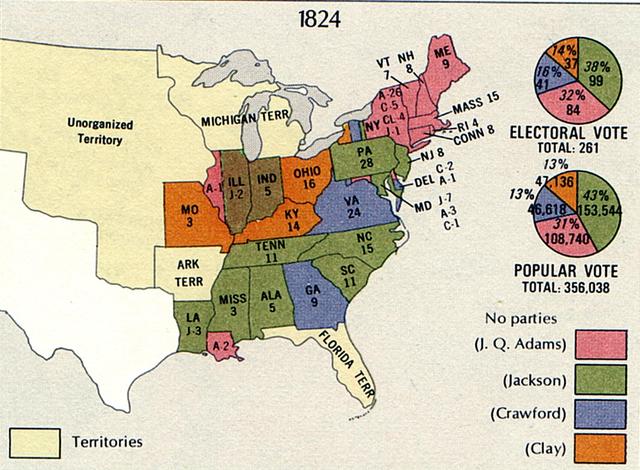
Image Courtesy of Truman Library
In the end, Andrew Jackson won the popular vote and the electoral vote from most states, but he was outmaneuvered in the house by his opponents. The House of Representatives voted to elect John Quincy Adams as president, with Henry Clay as his running mate. This election caused a lot of controversies because it was perceived that Henry Clay influenced the result of the election by throwing his support behind Adams in the House of Representatives, and Clay was appointed as the Secretary of State.
Democracy and Citizenship under Adams
These controversial election results were a main factor in Jackson's later presidential campaign and win in 1828, but there are a few policies that were instated during Adams' presidency that aided Jackson's victory as well.
During Adams' presidency, most states eased voting requirements, thereby enlarging the voting population. The expansion of suffrage (voting rights) meant candidates had to be able to speak to the concerns of ordinary Americans. Jackson took advantage of this and painted himself as the "common man" and Adams as an elitist.
The Election of 1828
The main candidates were Andrew Jackson, the candidate of the Democratic Party, and John Quincy Adams, the incumbent president and candidate of the National Republican Party. The campaign was marked by personal attacks and mudslinging from both sides, with Jackson and his supporters accusing Adams of being corrupt and elitist, while Adams and his supporters portrayed Jackson as an uneducated and dangerous demagogue.
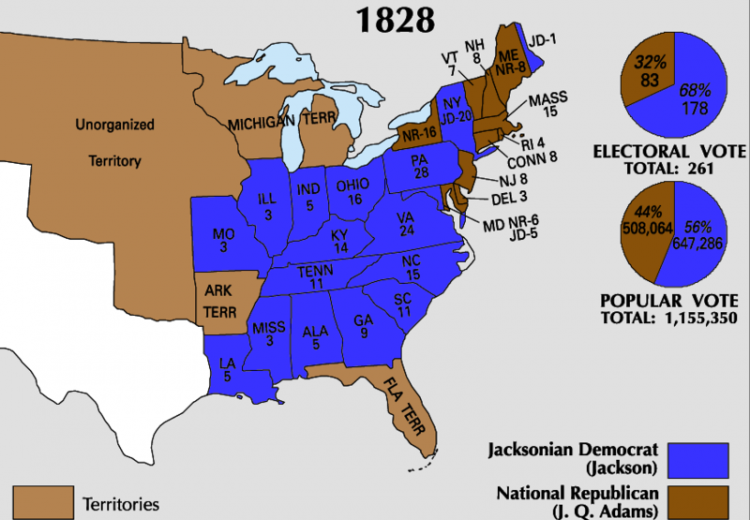
Image Courtesy of the National Endowment for the Humanities
Andrew Jackson won a decisive victory, receiving 178 electoral votes to Adams' 83, and a significant popular vote margin. This election marked a turning point in American politics for several reasons:
- It was the first time a president had been elected by a majority of popular votes.
- It marked the emergence of the Democratic Party as a dominant force in the U.S.
- It set the stage for a new era of politics marked by increased participation and political activism from the common people because of the expansion of suffrage.
Jackson's Presidency
Spoils System
When Jackson came into office, he pledged to clean up the federal government, which he saw as corrupt and dominated by a wealthy elite (Adams). He believed that the best way to do this was to replace the existing bureaucrats with his own supporters, which he did on a large scale after his election.
This was called the spoils system, and he gave out government jobs to political supporters regardless of their qualifications or experience. This is named after the phrase “to the victor, belongs the spoils.” It gave him more advantage as more people within the government would support him.
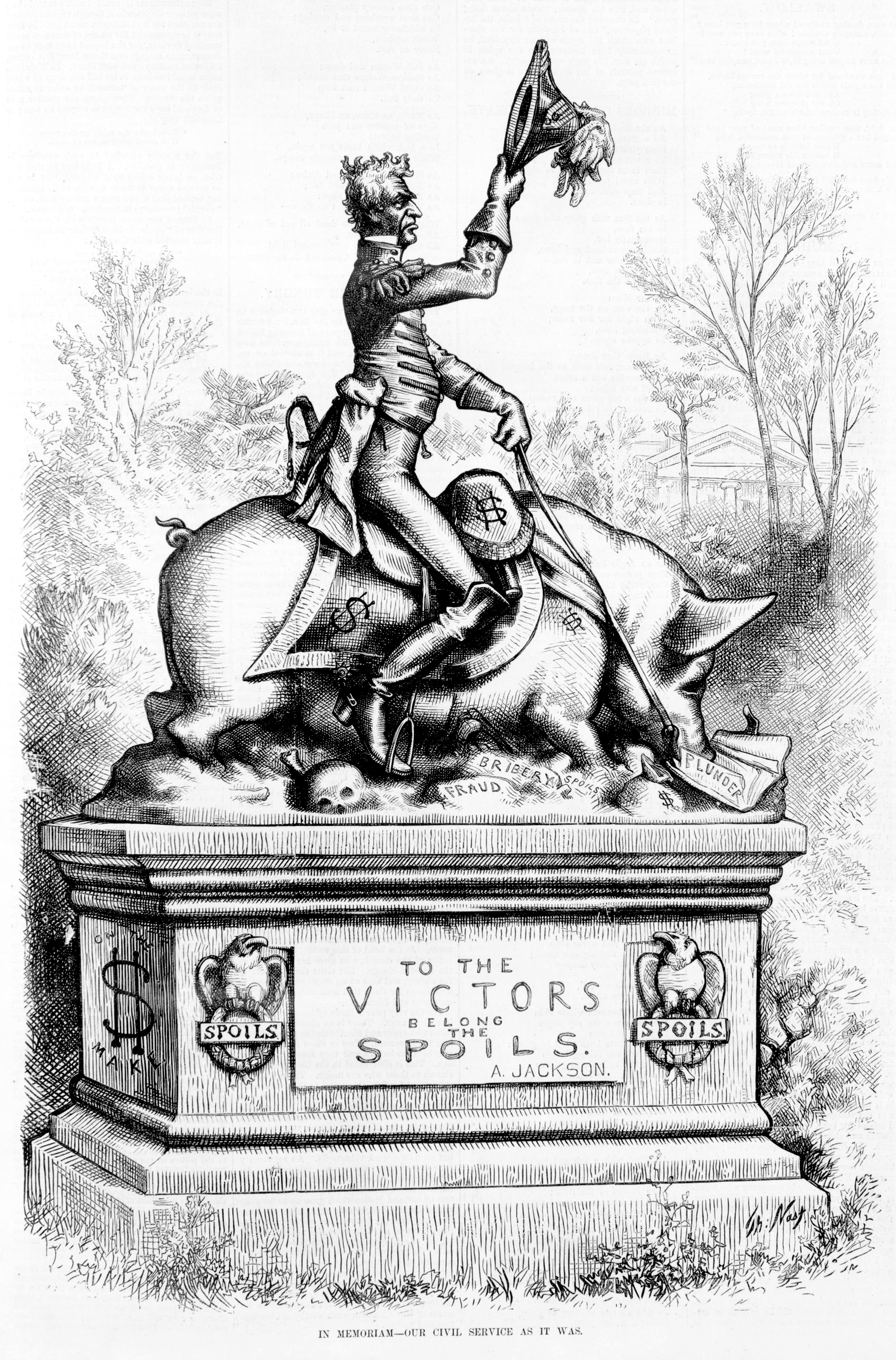
Image Courtesy of Wikipedia
This led to widespread patronage and corruption, as many of the people appointed to government jobs were more interested in using their positions for personal gain than in serving the public. Remember the Enlightenment ideas? The government's purpose is to serve the public and protect citizens' natural rights, so this system was widely criticized for its corruption and inefficiency.
Tariffs of Abominations
The Tariffs of Abominations were a series of tariffs passed by the United States Congress that were intended to protect American industry from foreign competition.
The Tariff of 1828, also known as the "Tariff of Abominations" by its opponents, was the first of these tariffs. It was passed by a Congress controlled by the Northern states and signed into law by President John Quincy Adams. It basically raised the average rate of taxes on imported goods to around 20%.
Many states were angered by this Tariff, but especially those in the South, where it hurt plantation owners the most. How come? Well, this tariff increased the prices that Southern farmers paid for manufactured goods and threatened to undermine their foreign markets by inciting counter-protection.
Basically, the imported goods that Southerners relied on increased in cost, protecting Northern manufacturers. You can imagine how much this caused a sectional divide between the North and the South. Jackson's own vice president, John C. Calhoun, drifted apart from Jackson because of his change in beliefs. He turned from being a nationalist to supporting states' rights, viewing these tariffs as the opposite of beneficial.
The Nullification Crisis
In what became known as the Nullification Crisis, Calhoun wrote the "South Carolina Exposition and Protest," stating that states had the right to nullify any federal laws which they deemed unconstitutional. Jackson attempted to compromise by lowering tariffs, but South Carolina ended up nullifying the tariffs.
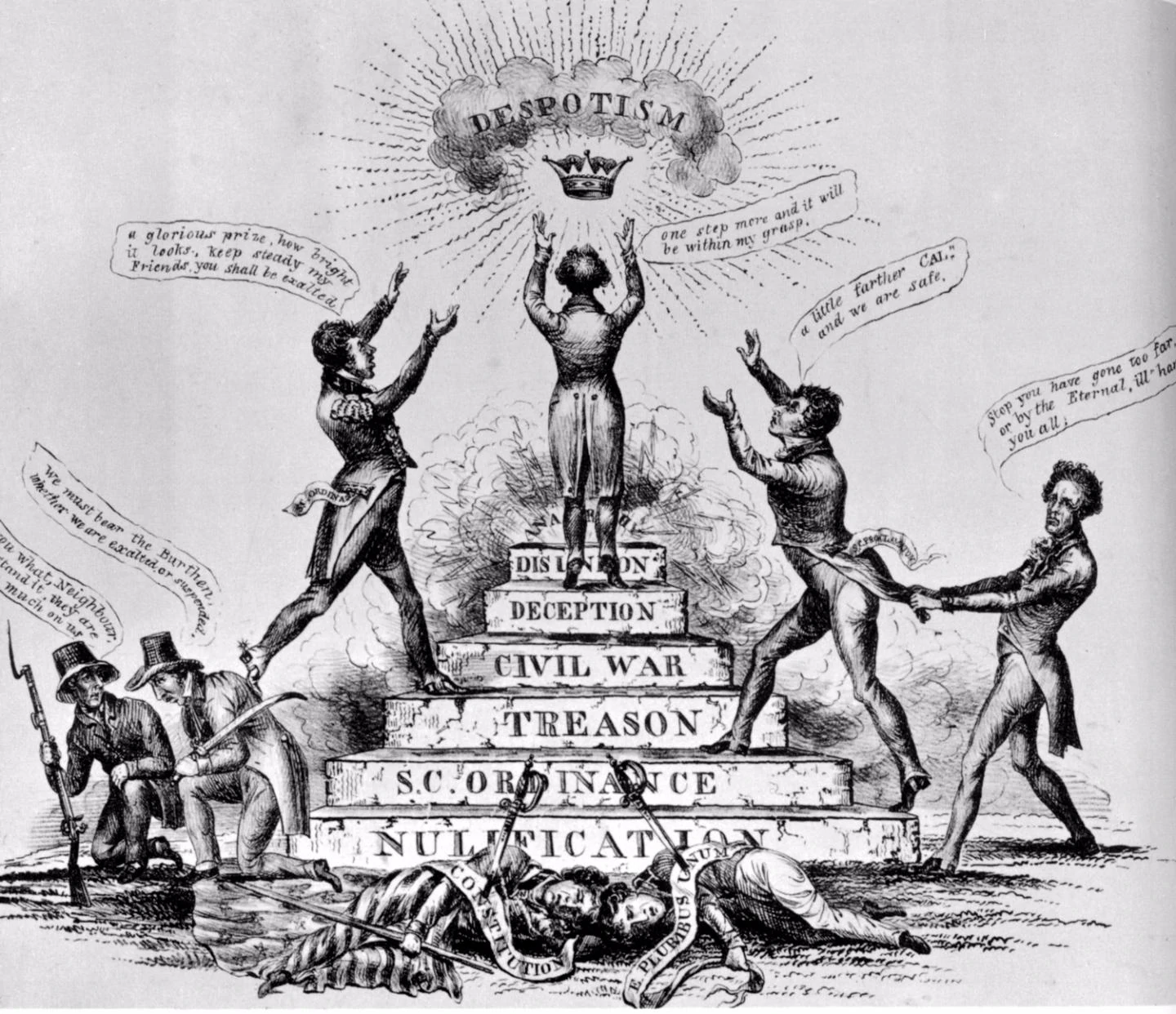
Image Courtesy of Historica Wiki
The crisis reached a boiling point in 1832 when South Carolina passed an ordinance formally nullifying the tariff, and also threatened to secede if force was used to make them comply.
Angered, Jackson passed the Compromise Tariff of 1833 and the Force Bill, which gave him the power to use federal military arms against the state if needed (just to enforce federal law!). South Carolina nullified the Force Bill, but accepted the Compromise Tariff and the crisis was over.
The National Bank Battle
Nicholas Biddle took over the presidency of the National Bank. In an era of rising white man's democracy, an obvious objection to the Bank was that it possessed great power and privilege without being under popular control. Many thought that the bank assisted the wealthy, including President Andrew Jackson. When the bank came up for recharter, Jackson vetoed it.
Jackson was not content with preventing the Bank from getting a new charter. He then resolved to remove federal deposits from Biddle’s vaults. Jackson stated, “The bank….is trying to kill me, but I will kill it.” He eventually declared war on it by giving deposits from the Bank of the U.S. to “pet banks.”

Image Courtesy of WIkipedia
Basically, Jackson ordered that federal money cease to be deposited in the National Bank and instead be placed in 23 different state banks. Since Jackson did not regulate the pet banks much, these banks printed a lot of paper money and caused an economic issue.
Jackson finally made a requirement that land had to be purchased with hard money through Specie Circular. It required that all future purchases of all federal lands be made in specie (gold and silver) rather than in paper banknotes. Banknotes lost their value and land sales plummeted.
Panic of 1837
The Panic of 1837 was a severe financial crisis that struck the United States in 1837 and lasted for several years. It was caused by a combination of factors, including falling demand for cotton, the primary export of the United States, which led to a decline in land values and an economic recession. Jackson's deposition of federal money into state-chartered banks was a large contributing factor as well since it led to a decrease in trust in the banking system.
The panic led to a sharp contraction of credit, a decline in asset values, and a wave of bank failures. The economic recession that followed was severe, with high unemployment, a collapse in trade, and a decline in the value of goods and services.
Most of the state banks also went bankrupt, leading to their bank notes becoming worthless and people using them becoming bankrupt as well.
The Peggy Eaton Affair
Peggy Eaton was the daughter of a Washington tavern owner and married Jackson's Secretary of War: John Eaton. Because of gossip about her moral character, the wives of other cabinet members refused to receive her socially. Jackson became her fervent champion because he found the charges against her as reminiscent of his late wife who had died just prior to his election. Jackson tried to force the cabinet wives to accept Peggy Eaton socially, and most of the cabinet resigned.
At the end of the day, this wasn’t too disastrous for Jackson as he utilized a group known as the “kitchen cabinet”. They did not belong to his official cabinet. Because of them, the appointed cabinet had less influence on policy than under earlier presidents.
The Indian Removal Act
After the boost of the cotton economy, whites began to look for more land and started to pressure Native Americans as well as the government to prepare the land to grow crops. Many of these goals were accomplished, and the Native American tribes often found themselves getting kicked off their lands.
Andrew Jackson passed the Indian Removal Act of 1830, allowing the federal government to exchange the Indian lands in the East for the lands in the West and pay money for any losses. This policy, commonly referred to as Indian Removal, ultimately led to the forced relocation of thousands of Native American tribes living in the southeastern United States, including the Cherokee, Creek, Chickasaw, and Seminole, to Indian Territory, which is now present-day Oklahoma.
The Cherokees attempted to go against the Indian Removal Act through Supreme Court decisions. Both cases, Cherokee Nation v. Georgia and Worcester v. Georgia, enabled the Cherokees to be labeled as a sort of ward to America. The Supreme Court decided that this status allowed the Cherokees to stay within their lands.
Jackson, not happy about the Supreme Court’s decision, stated “Mr. Marshall has made his decision, now let him enforce it,” showing one of the weaknesses of the judiciary: the inability to enforce their decisions. Jackson refused to let the Cherokees stay and forced them to move to a new reservation in the Oklahoma Territory. The Cherokees’ trip to their new lands, called the Trail of Tears, resulted in more than a third of them dying from disease, starvation, and exposure.
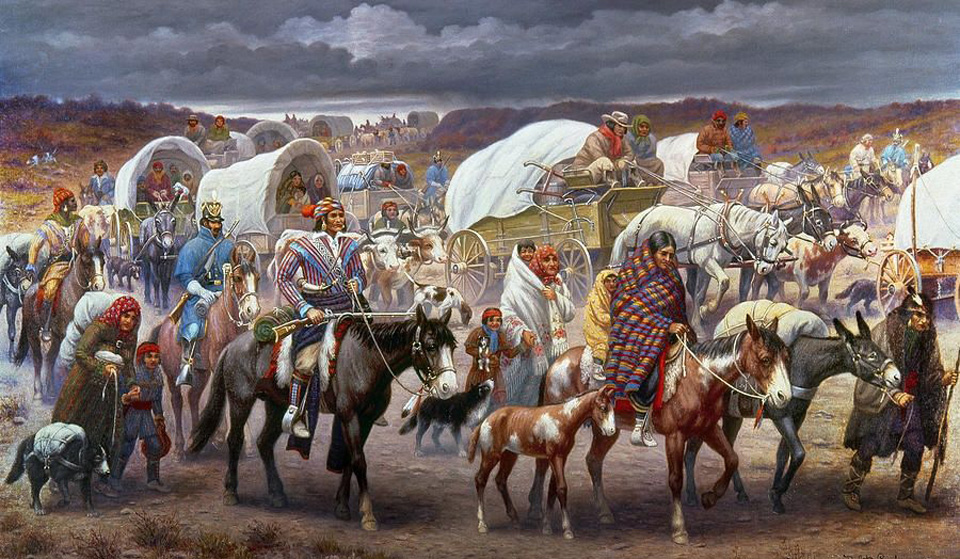
Image Courtesy of People's World
The Veto President
Jackson also vetoed several bills that he felt would have expanded the power of the federal government, and he strongly supported states' rights. He also used his presidential veto power more than any other president before him, earning him the nickname "The Veto President".
The Second Party System
By the 1820s and 1830s, the political landscape in the United States had begun to shift and new political parties began to emerge. The two main parties that emerged were the Democrats, led by Andrew Jackson, and the Whigs, led by Henry Clay.
- The Democrats, under Andrew Jackson, advocated for a more limited role for the federal government in the lives of Americans, and they were particularly opposed to the idea of a national bank and federal involvement in infrastructure projects. They believed in a strict interpretation of the Constitution and supported states' rights and individual liberty.
- We haven't mentioned this yet, but Jackson opposed infrastructure building, believing that construction projects only benefited people living within those areas. He thought they violated the powers granted to Congress in the Constitution.
- On the other hand, the Whigs, under Henry Clay, believed in a more active role for the federal government, particularly in the areas of economic development and modernization. They supported the idea of a national bank and federal funding for internal improvements such as transportation projects, and a more protectionist tariffs policy. They also believed in a less strict interpretation of the Constitution that allows for more federal power.
The main issue that brought the Whig Party together was opposition to the policies of President Jackson, particularly his veto of the National Bank, his handling of the "spoils system" and the Indian Removal Act. Whigs also opposed the expansion of slavery into new territories and the idea of nullification which was advocated by some states.
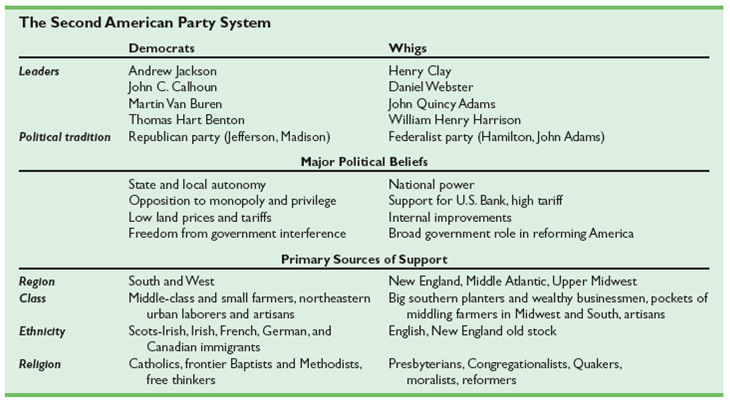
Image Courtesy of Blendspace
The Whig Party was able to attract a diverse group of supporters, including Northerners who opposed the expansion of slavery, Southerners who opposed Jackson's economic policies, and former National Republicans who opposed Jackson's leadership style and the Democratic Party's increasing dominance.
The party's name came from the "whigs" of 18th-century England, a political faction opposed to the British monarchy's absolute power, and the party defined itself as the heir of the Federalists and National Republicans.
As a result of the development of a new political party, the Whigs and Democratic-Republicans created the Second Party System.
Presidency of Martin Van Buren
Martin Van Buren became president after Andrew Jackson, and his presidency was in midst of an economic crisis, the Panic of 1837. Although the main problem lay in the bank notes, Van Buren still kept to the policy of hard money, which did not help the economy too much.
During Van Buren’s presidency, America also had disputes with Canada about its borders. Congress allowed troops and money just in case a war broke out, but Van Buren preferred to avoid war and instead, find a solution.
Texas had been ready for annexation by America during Jackson’s presidency, but Van Buren opposed it. Since Texas banned slavery, he feared that admitting Texas as a state would tip over the balance of free and slave states, similar to Missouri’s admission earlier on. Thus, Texas remained an independent nation for a few more years.
Browse Study Guides By Unit
🌽Unit 1 – Interactions North America, 1491-1607
🦃Unit 2 – Colonial Society, 1607-1754
🔫Unit 3 – Conflict & American Independence, 1754-1800
🐎Unit 4 – American Expansion, 1800-1848
💣Unit 5 – Civil War & Reconstruction, 1848-1877
🚂Unit 6 – Industrialization & the Gilded Age, 1865-1898
🌎Unit 7 – Conflict in the Early 20th Century, 1890-1945
🥶Unit 8 – The Postwar Period & Cold War, 1945-1980
📲Unit 9 – Entering Into the 21st Century, 1980-Present
📚Study Tools
🤔Exam Skills
👉🏼Subject Guides
📚AMSCO Notes

Fiveable
Resources
© 2025 Fiveable Inc. All rights reserved.